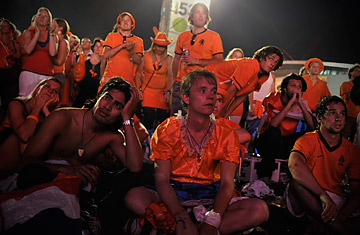
Dutch soccer fans in downtown Amsterdam on July 11, 2010, after their team lost the World Cup final match against Spain
It was in the 26th minute of extra time in the World Cup final between Spain and the Netherlands on July 11 that Spanish midfielder Andrés Iniesta broke free from his defender, lightly touched the ball with his right foot, steadied himself and then — for this hopeful, expectant city — committed the ultimate of all party fouls. Around 100,000 Dutch fans had gathered at Amsterdam's Museumplein (Museum Square) to put themselves through soccer's unique brand of compulsive, collective torture, ready to kick off one hell of a celebration party. But then Iniesta slotted in Spain's late winning goal, and within minutes deflated Dutch fans began pouring out of the square, like blood draining from the heart of the city.
"Cancel your plans and go back to your hotel," Barry van Leeuwen, 24, advised. "Everyone is going home to bed."
Yes, on Monday Amsterdam would return to its wan, gray-canalled self, but for a blessed few hours on Sunday, the city belonged to orange. It is often said of the Netherlands — a prosperous Northern European country of 16 million — that its people's character is like its countryside: bland and indistinct. Amsterdam's famously lax attitude toward drugs and sex belies the staid, insular nature of its society. A chance to don their lurid national color — chosen in homage to the former Dutch ruler William of Orange and his royal lineage — and cheer with abandon for their highly successful team has always offered the Dutch a much needed form of romantic expression.
On July 11, I witnessed Amsterdam transform like a sudden spring blossom. After a quiet weekend of buildup, the Orange began appearing en masse around four hours before kickoff. They filled the bars and cafés, spilling into the street and circling around entrances like giant orange tongues sticking out at the Dutch convention of gezelligheid, literally coziness. "We have a good way of life here. A quiet life," Barend Meyer, 82, told me before the match. "So maybe it's good we should go a little crazy together every now and then."
If this staid, reasonable country looks to soccer to express a sublimated recklessness in its character, that might explain why it has been so tortured by a debate that has nagged the Dutch national team since it began its impressive 25-game undefeated streak on the way to the World Cup final. Great Dutch teams of the past — the country was twice a World Cup finalist in the 1970s — played with mercurial, heedless abandon in an aesthetically pleasing system of play known as totaalvoetbal (total football). In short, they have played with a very un-Dutch verve and panache, or the soccer equivalent of bright, brilliant orange.
But this year's team was different; it played a structured, defensive and disciplined style. The team's most creative player, Arjen Robben, has said he would prefer to play ugly and win, and the coach, Bert van Marwijk, has said that while he loves totaalvoetbal, "I also love winning." Johan Cruyff, the talisman of the great 1970s squads, said before the final that the Spanish, with their skillful, tika-taka passing game, more closely resemble the classic Dutch style.
That sentiment, shared by many in the Netherlands, led to soul-searching and head-scratching among some Dutch supporters, who felt uneasy about trading style for success. Anne Karelse, 29, from Dordrecht, traveled to Amsterdam for the final without his elder brother, who grumpily insisted on staying home to watch the match alone. "He said we no longer play like the Dutch, so he doesn't want to support the team," Karelse said. "I tell him, 'Maybe that's true, but I know you are still happy when we win.'" Lars Klaverstyn, 30, said that the Dutch are learning an important lesson: "What is beauty? It is not ooh and aah with your passes. What is beautiful in sport is hard work and success." Paul van der Laarse, 67, said that's a lesson with which the Dutch should be familiar. "Our great teams of the 1970s were temperamental, they quarreled. Now there is solidarity in our team. We work hard and play safe. To me, that feels more Dutch."
While it proved insufficient to win the final, a good dose of solidarity might be just what the Dutch need to recover from the loss. There is no parallel in American culture to the passion Europeans share for the World Cup. In the Netherlands, 12.3 million people, or nearly 80% of the population, watched the team's semifinal against Uruguay. While some African and South American commentators, including the Ivorian superstar Didier Drogba, have expressed concern that developing countries' collective obsessions with soccer might distract them from important societal issues, the Dutch seem to place soccer in its proper perspective. After the match, from a perch on the bridge of a canal, I watched as the orange-shirted fans retreated like fireflies into the closing gloom. When I stopped a few to gauge their feelings, I was surprised to find them upbeat. "Life goes on," Cecille Pool, 48, said in a typical sentiment. "Of course everyone is disappointed, but it's a game. Both sides played well, but one side had to lose. Tomorrow we'll go back to normal. We are Dutch, after all. Not too hot and not too cold."
